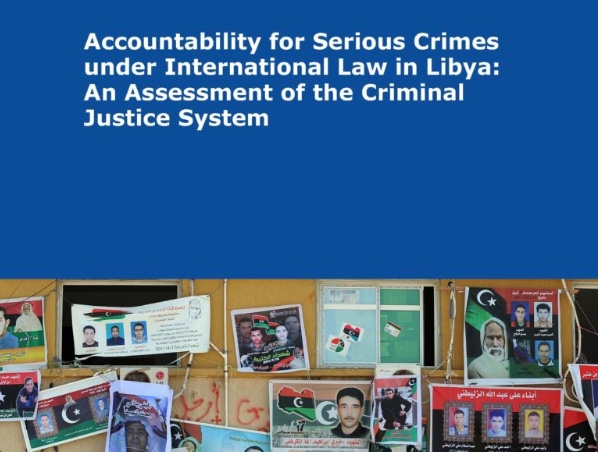
Oct 3, 2019 | News
Today, ICJ and the Defender Center for Human Rights (DCHR) filed a submission to the Human Rights Council’s Working Group on the Universal Periodic Review in advance of its review of Libya’s human rights record in May 2020.
Information provided in the submission was based on the ICJ report titled Accountability for Serious Crimes under International Law in Libya: an Assessment of the Criminal Justice System, published in July 2019.
In the submission, the ICJ and DCHR drew the attention of the Working Group on the UPR to the following concerns with respect to Libya:
- Impunity for crimes under international law committed by State and non-State actors;
- The insufficient penalization of crimes under international law;
- The lack or inadequacy of investigations and prosecutions of crimes under international law;
- The systemic failure to guarantee the right to liberty and fair trial rights at pre-trial and trial stages.
The ICJ and DCHR called on the Working Group and the Human Rights Council to urge the Libyan authorities to take the following actions:
With regard to insufficient penalization of crimes under international law:
- Enact laws criminalizing war crimes, crimes against humanity and arbitrary deprivations of life (in particular arbitrary and summary executions) in line with international law;
- Amend Law No. 10 of 2013 to bring the definition of torture in line with the Convention Against Torture and the definition of enforced disappearance in line with the International Convention for the Protection of All Persons from Enforced Disappearance, and criminalize other acts of cruel, inhuman or degrading treatment or punishment consistent with international law;
- Amend article 425 of the Penal Code to include a definition of the crime of slavery consistent with international law;
- Amend articles 407 and 408 of the Penal Code to criminalize rape in line with international law and standards; enact laws criminalizing all forms of sexual and gender-based violence; and repeal article 424 of the Penal Code which extinguishes a conviction for rape or indecent assault and grants a stay of execution of the penalty imposed against the perpetrator if they marry the victim; and
- Amend (or repeal) Law No. 35 of 2012, Law No. 38 of 2012 and Law No. 6 of 2015 to exclude all crimes under international law from the scope of amnesties.
With regard to the obligation to independently and impartially investigate crimes:
- Amend article 3 of the Code of Criminal Procedure (CCP) to remove the requirement that an investigation can only be commenced upon the receipt of a criminal complaint, extend the three-month deadline for victims to file a complaint and remove the deadline entirely for crimes under international law and for other serious crimes under domestic law;
- Amend article 7 of the CCP to grant victims’ family members the right to file a complaint with a view to ensuring the commencement of an investigation;
- Repeal article 224 of the Penal Code to remove the power of the Minister of Justice to control and direct investigations and prosecutions by the Prosecutor’s Office; and
- Repeal Decree 388 of 2011 granting the “Supreme Security Committee” investigative powers and article 2 of Law No. 38 of 2012 permitting the use of information and evidence collected by “revolutionaries” during investigations and at trial.
With regard to the systemic failure to guarantee the right to liberty and fair trial rights at pre-trial and trial stages, amend the CCP in order to:
- Exclude the possibility of detaining an accused on the sole ground that she or he does not have a fixed place of residence;
- Set a maximum duration of pre-trial detention, and specify that any such detention should be employed as last resort only when necessary, proportionate and reasonable according to the circumstances of the case;
- Ensure that detainees are brought before an independent and impartial judicial authority promptly following arrest, and no later than 48 hours in any event;
- Include a provision recognizing the right to habeas corpus, and the right to compensation and other reparations for unlawful detention;
- Provide for the right to legal counsel from the moment of arrest in all circumstances, and repeal the provision requiring a lawyer to seek authorization from the investigating judge to speak during the interrogation of the accused;
- Require the disclosure of all evidence to the accused and allow them to make copies of the case file before a case is referred to court for prosecution; and
- Grant individuals the right to appeal any conviction and sentence on alleged errors of law and fact and to reconsideration of a conviction upon discovery of a new fact.
Download
Libya-UNHCR submission final-advocay-non legal submission-2019-ENG (submission in PDF)
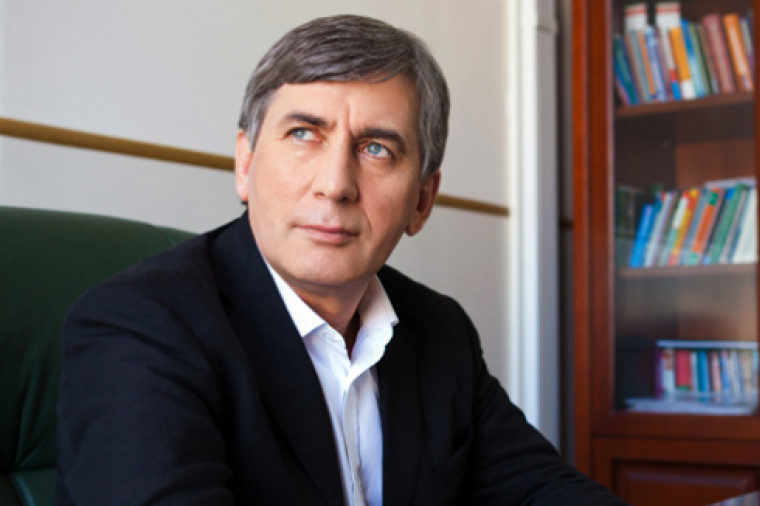
Sep 24, 2019 | News
The ICJ today called for an end to criminal proceedings against Dagir Hasavov, a prominent Russian lawyer facing prosecution on allegations of obstruction of justice.
On 17 September, less than a week after lawyer Dmitriy Sotnikov was physically attacked in court, Dagir Hasavov was detained by police in the Lefortovo court building in Moscow. He was charged with “obstruction of justice” and “bribery or coercion to testify or evasion of giving evidence” (articles 294.1 and 309.4 of the Russian Criminal Code). On 18 September, Moscow Basmanny court authorised the detention of Hasavov until 16 November.
“There are strong indications that these charges are spurious and that the arrest of Dagir Hasavov is an attempt to obstruct him in carrying out his professional duties, and to prevent his clients from having a fair trial. The proceedings should be discontinued and he should be immediately released.” said Róisín Pillay, ICJ Europe and Central Asia Programme Director. “Such arrests also send a clear message of intimidation to other lawyers. Without urgent measures to end harassment of lawyers, the ability of the legal profession to protect human rights will be increasingly jeopardized”.
Dagir Khasavov represented the former Dagestan Prime Minister Abdusamad Hamidov, who was detained together with his deputy Rayudin Yusufov by the FSB in February 2018 as part of a special anti-corruption operation and was charged with multiple criminal offences, including embezzlement.
Prosecutors allege that Dagir Hasavov threatened Albert Havchaev, a witness in the trial, and attempted to coerce him to testify in court for the benefit of the defence. Hasavov’s home was also searched.
Eduard Isetskiy, another lawyer of the former Dagestan Prime Minister, has stated that after the arrest of Hasavov he and other colleagues were told by investigators that they would face similar prosecution. He added that towards the end of a trial, about a week before the Hasavov’s arrest, the State Prosecutor on the case was replaced and the courtroom became increasingly surrounded with armed and masked security forces. The new prosecutor called lawyers “extremists” and filed a motion to have all their social networks accounts blocked.
Any criminal proceedings against the lawyer amounting to harassment or reprisals for his professional activities would constitute not only an assault on the legal profession in the Russian Federation, but also a violation of the right to a fair trial, protected under international human rights law.
Moreover, international standards on the rights of lawyers, including the UN Basic Principles on the Role of Lawyers, provide that governments must ensure that lawyers “are able to perform all of their professional functions without intimidation, hindrance, harassment or improper interference” and “shall not suffer, or be threatened with, prosecution or administrative, economic or other sanctions for any action taken in accordance with recognized professional duties, standards and ethics.”
The ICJ stresses that these attacks, arrests and criminal proceedings that have been taking place in Russia lately, create a chilling effect on the proper exercise of professional duties by lawyers, endangering the right to a fair trial and undermining the justice system.
Additional information:
Dagir Hasavov is a prominent lawyer in Russia who has taken many cases dealing with allegations of religious extremism or terrorism. He has defended among others the Moscow imam Mahmud Velitov, convicted for justification of terrorism; the former representative of the President in Sakhalin oblast charged with extremism; several persons accused of participation in Hizb ut-Tahrir, the organization banned in Russia. He also represented pro bono the parents of a murdered 5-year-old Tajik girl Huvaido Tillozoda.
It has been reported that around 100 lawyers are joining together to defend Hasavov as the Russian legal community has realized the need for corporate solidarity in the face of the increasing threats to the security of lawyers and independence of the profession.
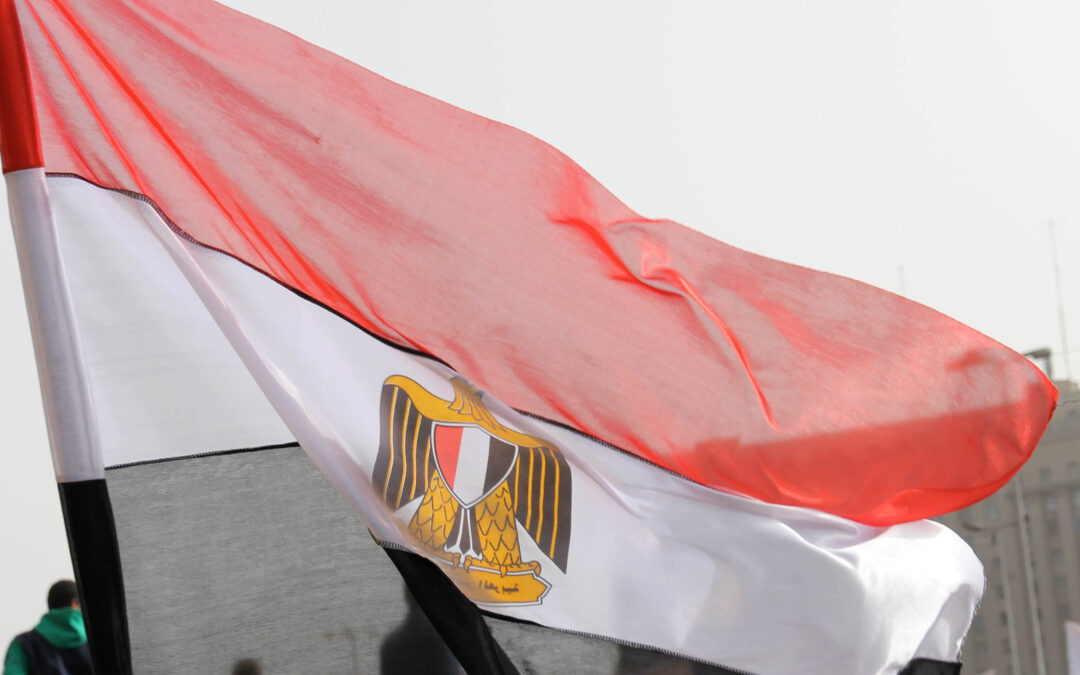
Apr 24, 2019 | News
Egypt is hosting an Africa human rights summit meeting beginning April 24, 2019, while its government is presiding over the worst human rights crisis in the country in recent decades.
The 64th Ordinary Session of the African Commission on Human and Peoples’ Rights (ACHPR), the African Union’s top rights body, will take place from April 24 to May 14 in Sharm al-Sheikh.
In addition to its systematic failure to respect and protect human rights at home, Egypt has also led efforts to undermine the Commission’s independence. The Commission should strongly raise Egypt’s human rights abuses at the meeting.
“Egypt is trying to appear like a country open for human rights delegates and summits while, at the same time, crushing all dissenting voices and its once-vibrant human rights community,” said Michael page, Middle East and North Africa director at Human Rights Watch.
“We know that many Egyptian and international organizations are not allowed to work freely in Egypt and cannot voice concerns without severe retaliation from the government,” he added.
The commission should ensure that all government and non-government delegations are able to participate freely in the summit. It should also make clear that it will strongly address any measures of reprisals by the Egyptian authorities against criticism of its practices.
A senior staff member of a leading Egyptian rights organization told Human Rights Watch that only three Egyptian human rights groups were considering participating in the summit because most of the groups were concerned about retaliation by the government.
In recent years, the Egyptian authorities have relentlessly cracked down on non-governmental organizations, issued the 2017 draconian law that effectively bans all independent work by nongovernmental groups, and prosecuted scores of staff workers of Egyptian organizations.
It has also frozen the assets of the most prominent human rights defenders in the country and their organizations and issued travel bans against scores of them.
In April 2018, the government said it would repeal the abusive 2017 NGO law but the government has not made a new draft law public.
The Egyptian authorities have also taken reprisals against human rights defenders and activists for cooperating with regional and international human rights monitors, including United Nations agencies and experts.
In late 2018, Egyptian authorities detained several citizens who met with the UN special rapporteur on adequate housing during her official mission to Egypt, as well as demolishing their houses and banning their travel. The government denied any wrongdoing and accused the UN High commissioner on human rights and other UN officials of breaching UN standards and adopting the “lies” of “terrorist” organizations.
In September 2017, officials stopped Ibrahim Metwally, a lawyer and co-founder of the Associations of the Families of the Disappeared, from traveling for meetings with UN officials in Geneva. Security agencies arrested him at the airport and held him incommunicado for a few days. He is still held in “pretrial detention” for farcical charges.
The Egyptian government has tried to undermine the independence of the Commission through spearheading the adoption of African Union’s Executive Council’s Decision 1015, paragraph 5. The provision, which was passed in June 2018, undermines the Commission’s independence by subjecting its work to control by the African Union member countries.
The Egyptian government has ignored decisions and resolutions the Commission and its experts have made addressing several violations and abuses including the crackdown on civil society, restrictions on freedom of religion, unfair trials and mass death sentences, arbitrary arrests, and sexual violence.
The ACHPR session comes at a time when the Egyptian authorities have been severely oppressing dissent and obliterating any space for peaceful expression or gathering before the public vote held between April 19-22 on highly draconian constitutional amendments that will strengthen the military control of public and political life and further undermine the already weak judicial independence.
Egyptian human rights organization have documented the arrests of over 160 people, often in mass arrests, since February in relation to the ongoing crackdown on dissidents and perceived critics.
These amendments, and several other laws that President Abdel Fattah al-Sisi has approved in recent years, such as new media laws and laws to expand the use of military courts to try civilians, violate international law standards including the African Charter on Human and Peoples’ Rights.
Since al-Sisi secured a second term in elections that were largely neither free nor fair in March 2018, his security forces have escalated a campaign of intimidation, violence, and arbitrary arrests against political opponents, activists, and many others who have voiced even mild criticism of the government.
The Egyptian government and state media have framed this repression under the guise of combating terrorism, and al-Sisi has increasingly invoked terrorism and the country’s state of emergency law to silence peaceful activists.
In July 2013, the African Union Peace and Security Council suspended Egypt’s membership in all African Union activities following the forcible removal of former President Mohamed Morsy by the army, which was led by al-Sisi, then the defense minister. The suspension ended after al-Sisi was elected President in June 2014.
But Egypt has failed to effectively investigate or to hold any official or member of the security forces accountable for the mass killings of protesters in the summer of 2013 despite several national and international calls, including by the ACHPR, and despite incriminating evidence.
In August 2013, Egyptian security forces most likely killed at least 817 people in a few hours during its violent dispersal of the largely peaceful pro-Morsy sit-in in Cairo’s Raba’ Square. The killings likely amounted to crimes against humanity.
“Through such summits, Egypt is trying to whitewash its dire record of abuses,” George Kegoro, executive director of Kenya Human Rights Commission said. “The African human rights commission should take the opportunity of this meeting to vigorously engage the Egypt government on its own actions that threaten the rights, and the very lives, of many Egyptians.”
The co-signing organizations are:
Andalus Institute for Tolerance and Anti-Violence Studies
Belady Center for Rights and Freedoms
Cairo Institute for Human Rights Studies
Committee for Justice|
EuroMed Rights
Egyptian Front for Human Rights
Human Rights Watch
Kenya Human Rights Commission
The Egyptian Commission for Rights and Freedoms
The Freedom Initiative
The International Commission of Jurists
Egypt-African Rights Summit-News-2019-ARA (Press release, PDF, Arabic)
Contact:
Said Benarbia, Director of ICJ’s MENA Programme, t: +41-79-878-35-46 ; e: said.benarbia(a)icj.org
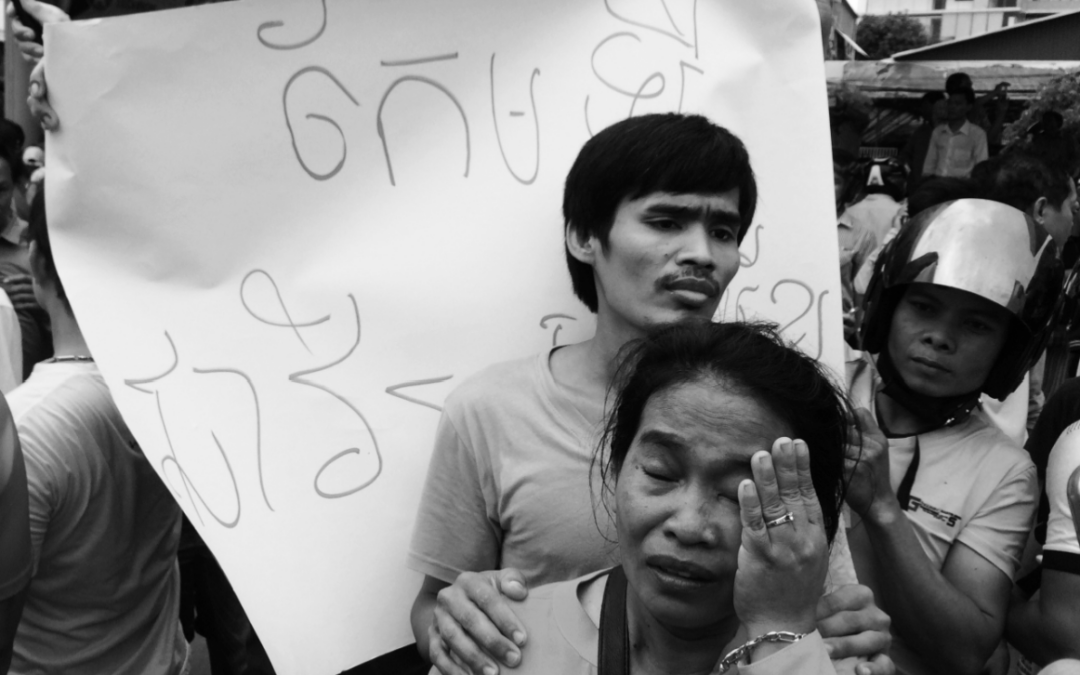
Jul 9, 2018 | News
Today, in advance of the second anniversary of the killing of political commentator and human rights defender, Kem Ley, the ICJ reiterates its call for the creation of a independent and impartial Commission of Inquiry to investigate his killing.
The ICJ remains deeply concerned at the apparent lack of progress in investigating the case, as well as the inadequacy of the investigation and prosecution of Oeuth Ang, the only person yet charged or convicted in relation to Kem Ley’s killing.
“The trial of Oeuth Ang left many unanswered questions about the investigation and the killing itself which Cambodia has an duty to resolve as part of the family and public’s right to know the truth,” said Kingsley Abbott, Senior Legal Adviser at the ICJ, who attended the trial.
“The fact that the killing occurred against the backdrop of escalating attacks against human rights defenders and the political opposition and in the context of a history of well-documented apparent extra-judicial killings makes the establishment of an independent and impartial Commission of Inquiry all the more pressing.”
On 7 July 2017, ahead of the one-year anniversary of Kem Ley’s killing, the ICJ and other organizations released a joint letter highlighting crucial concerns about the lack of progress in the investigation of his case, and calling on the Cambodian Government to establish a Commission of Inquiry to carry out an independent, impartial, effective and transparent investigation in line with international law and standards.
These include the International Covenant on Civil and Political Rights and the revised Minnesota Protocol on the Investigation of Potentially Unlawful Death (2016).
Background
At approximately 08:30 on 10 July 2016, Kem Ley, a prominent political commentator and human rights defender, was shot and killed at a petrol station on Monivong Boulevard in Phnom Penh.
Soon afterwards, Cambodian police arrested a suspect approximately two kilometers from the crime scene. The suspect identified himself as “Chuob Samlab”, from Banteay Meanchey province. “Chuob Samlab” means “Meet to Kill” in Khmer.
In a leaked video, “Chuob Samlab” reportedly “confessed” to shooting Kem Ley over a debt the political commentator allegedly owed him – a fact reportedly disputed by Kem Ley’s widow and “Chuob Samlab”’s own wife.
“Chuob Samlab” was later identified as Oeuth Ang from Siam Reap province, according to identity records.
On 23 March 2017, the Phnom Penh Municipal Court found Oeuth Ang guilty of the premeditated murder of Kem Ley on 10 July 2016 and sentenced him to life imprisonment.
The ICJ observed the trial which took place on 1 March 2017, following which it identified eight significant gaps in the investigation which had not been adequately addressed at trial.
Following the verdict, Oeuth Ang’s lawyer told journalists the court had created a new case-file to investigate two men named Pou Lis and Chak who may be relevant to the killing of Kem Ley.
Very little information has been revealed publicly about these possible new case-files.
Oeuth Ang appealed his sentence and, on 4 May 2018, the Court of Appeal reportedly heard the appeal.
There are no reports yet of a judgment being delivered.
Pursuant to international law binding on Cambodia, including the International Covenant on Civil and Political Rights (ICCPR) to which Cambodia is a State Party, Cambodia has a duty to promptly, independently, impartially, and effectively investigate all deaths suspected of being unlawful.
Investigations must seek to identify not only direct perpetrators but also all others who may have been responsible for criminal conduct in connection with the death.
Principle 11 of the UN Principles on the Effective Prevention and Investigation of Extralegal, Arbitrary and Summary Executions calls for the establishment of a Commission of Inquiry when ‘the established investigative procedures are inadequate because of lack of expertise or impartiality, because of the importance of the matter or because of the apparent existence of a pattern of abuse, and in cases where there are complaints from the family of the victim about these inadequacies.’
Read also
ICJ et al, ‘Cambodia: request to create a commission of inquiry into the killing of Kem Ley’
ICJ, HRW, Amnesty International, ‘Cambodia: Significant Questions Remain After Guilty Verdict in Kem Ley Trial’
ICJ, ‘Cambodia: Kem Ley’s killing demands immediate credible and impartial investigation’
Contact
Kingsley Abbott, ICJ Senior Legal Adviser, e: kingsley.abbott(a)icj.org
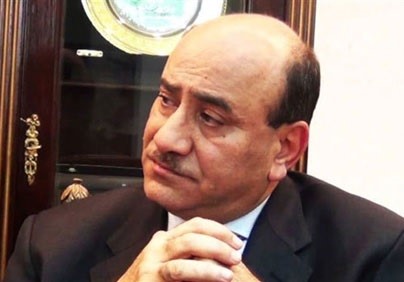
Apr 25, 2018 | News
The ICJ today called on the Egyptian authorities to quash the conviction of, and immediately release Hisham Geneina, a former judge and former head of the Central Auditing Authority in Egypt.
A Cairo military court convicted Geneina on Tuesday 24 April and sentenced him to five years in prison for “publishing false information harmful to the national security.”
The charges were related to a media interview in which Geneina criticized the interference of the Egyptian authorities in the election process and referred to the existence of documents that incriminate political and military leaders since 2011, including in cases of human rights violations.
The first hearing of the military trial took place on 18 April.
At the defense request, it was adjourned to 20 April so that the lawyers can have access the case file. The judgement was issued 4 days later.
“Genina’s detention, prosecution and conviction solely for peacefully and legitimately exercising his right to the freedom of expression is a testament to the length to which Egypt’s military and government would go to silence critical voices,” said Saïd Benarbia, ICJ MENA Director.
“After a grossly unfair trial before a military court that he should never have been prosecuted before in the first place, Egyptian authorities must stop the charade and immediately and unconditionally release Hisham Geneina,” he added.
Egypt – Geneina – News – Webstory – 2018 – ARA (Arabic translation in PDF)
Background
Hesham Genena was arrested on 13 February following a media interview in which he claimed, among other things, that the former Chief-of-staff Sami Annan was in possession of documents incriminating the country’s political and military leadership.
One day before his arrest, the military spokesperson said that Genena’s statement casts doubts on the State and its institutions in the time where the armed forces are combating terrorism in Sinai.
He added that the armed forces will use their rights as provided for in the Constitution and the law to protect national security, and that they will refer the matter to the relevant authorities to take legal action.
According to information provided by his lawyer, Geneina is currently in solitary confinement in the Cairo Appeal Prison and his health condition is deteriorating due to injuries related to a physical attack against him on 27 January, for which he needs surgical intervention.









